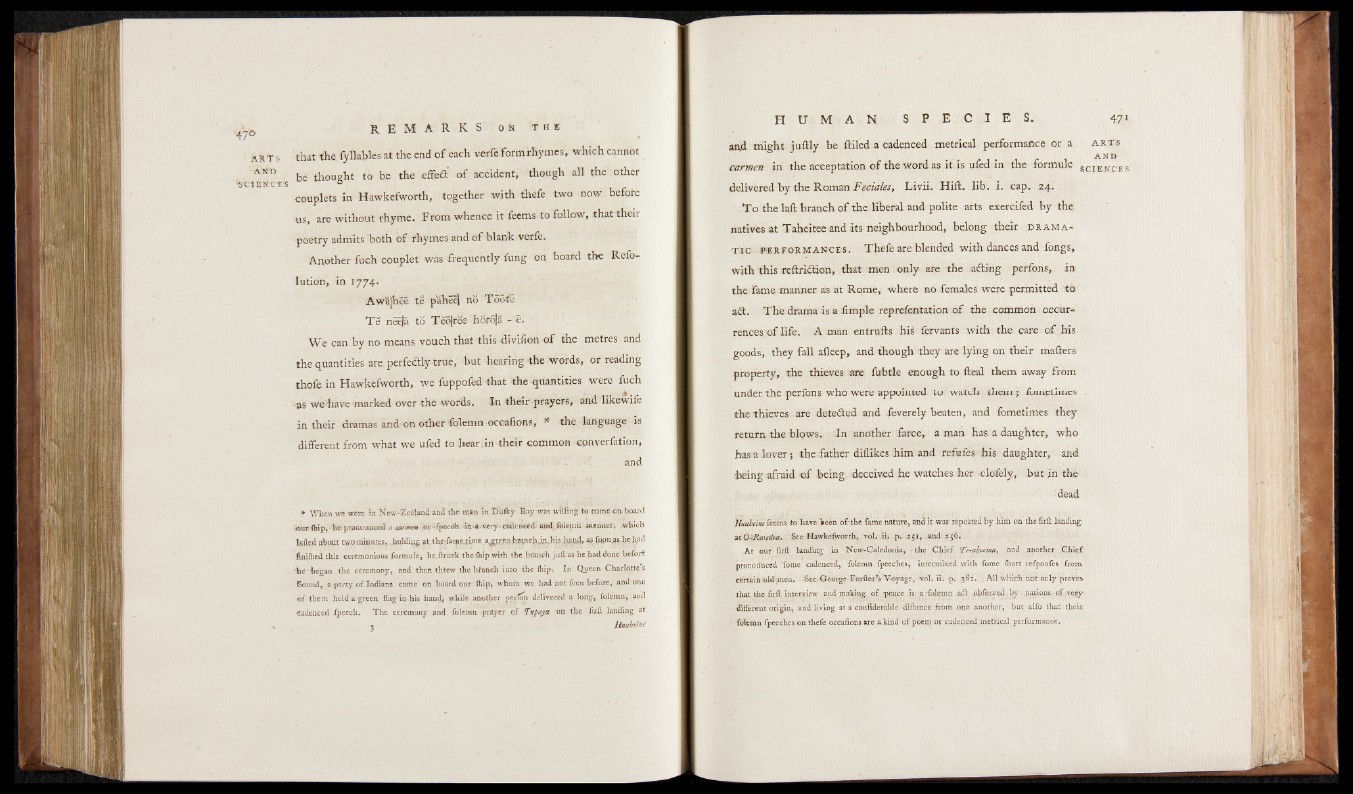
arts
AND
■ SCIENCES
that the fyllables at the end o f each verfe form rhymes, which cannot
be thought to be the effedt o f accident, though all the other
couplets in Hawkefworth, together with thefe two now before
us, are without rhyme. From whence it feems to follow, that their
poetry admits both o f rhymes and o f blank verfe.
Another fuch couplet was frequently fung on board the Refolution,
in 1774.
Awajhee te paheel no Toote
T e neeja to Teojree horfja - e.
W e can by no means vouch that this divifion o f the metres and
the quantities are. perfedtly true, but hearing the words, or reading
thofe in Hawkefworth, we fuppofed that the quantities were fuch
-as we have -marked over-the words. In their prayers, and likewife
in their dramas and-on other folemn-occaiions, the language is
different from what we ufed to hear in their common cpnverfation,
and
» When we were in Ncw-Zeeland and the min in Sulky Bay was willing to come an board
■ nhr -{hip, -he-pranouHoud a carmen lOr-fpeeuh -inut-vuiy-ce.de»6ed- and, loleinh-manner, .which
lafted about two1 minutes, .holding atthe-fkme time ,a^t.e,fc.n.-brancjh[.in.his fopn^s hchad
flnilhed this ceremonious formule, he [truck the Ihip with the branch juft as he had done before
-he-began .the edremony, and then threw the braneh into the Ihip1. In Queen Charlotte’s
Sound, a party of Indians came on board our Ihip, whom we had nbt fefen before, and one
of them held a green flag in his hand, while another per [on delivered a long, folcmn, and
cadenccd ipceoh. The ceremony and folemn prayer of Tvpaya on the firft landing it
Hnahtini
and might juftly be (tiled a cadenced metrical performance or a arts
carmen in the acceptation o f the word as it is ufed in the formule SCIENCES
delivered by the Roman 1 'eddies, Livii. Hilt. lib. i. cap. 24.
T o the laft branch of the liberal and polite arts exercifed by the
natives at Taheitee and Its neighbourhood, belong their dramat
i c - performances. Thefe are blended with dances and fongs,
with this reftridtion, that men only are the adting perfons, in
the fame manner as at Rome, where no .females were permitted to
aft. Th e drama is a fimple reprefentation o f the common occurrences
erf life. A man entrnfts his fervants with the care o f his
goods, they fall afleep, and though they are lying on their matters
property, the thieves are fubtle enough to fteal them away from
under the perfons who were appointed to watch them; fometimes .
the thieves are detected and feverely beaten, and fometimes they
return the blows. In another -farce, a man has a daughter, who
has a ,lover ; the father dillikes him and refufes his daughter, and
being afraid of being deceived he watches her clofely, but in the
dead
‘Huaheint feems to have been of-the fame nature, and it was- repeated by him on the firft landing
ztOJRaipdea. See Hawkefworth, vol. ii. p. 251, and 256.
At our firft landing in New-Caledonia, - the Chief Te-abooma, and another ,Chief"
pronounced 'fome cadenced, folemn fpeeches,. intermixed with fome fhort refponfes from
certain-old-men. -See George Forfter’s Voyage, -vol. id. p. 3-82... All which not only proves
that the firft interview and ipaking of peace is a-folemn .aft obfer-ved by nations. of ,-veiy
different origin, and living at a confiderable diftance from one another, but alfo that their-
folcmn fpeeches on thefe occafions are a kind of poem or cadenced metrical performance*